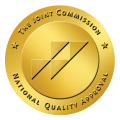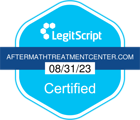Even after you’ve completed treatment and achieved sobriety, trying not to fall back into harmful old patterns can be challenging. Unfortunately, there’s no off switch to make the weight of all these changes go away. But having a relapse prevention plan can help you get through some of the more challenging parts of recovery without losing all the progress you’ve made. Here’s what you need to know about relapse prevention planning.
Approximately 40 to 60% of people in recovery relapse within the first year after treatment. Although this may seem shocking, keep in mind that this number is actually quite similar to the relapse rates of other chronic diseases like hypertension and diabetes. The good news is that recognizing the signs of emotional and mental relapse and getting help at those stages can help minimize your risk of physical relapse. Creating a relapse prevention plan with the help of Aftermath Addiction Treatment Center can also help.
What Is a Relapse Prevention Plan?
A relapse prevention plan is a written list of strategies that can help you avoid relapse. The goal of the plan is to help you recognize the signs of relapse, avoid triggers, and keep you from reengaging in any form of substance abuse.
Generally, your recovery specialist or sponsor will work with you to create a relapse prevention plan after you complete an addiction treatment program. The plan can be as detailed or open-ended as you like as long as you include a wide range of strategies and tools that’ll help you maintain your sobriety. For example, you may want to include self-care ideas, stress-relieving strategies, techniques to deal with cravings, and a list of people to reach out to when you need a helping hand.
Steps To Create A Relapse Prevention Plan
Whether you choose to create your relapse prevention plan on your own or with their help, there are a series of steps you can take to create an effective relapse prevention plan. Here’s how:
1. Take Some Time To Reflect On Your History with Drugs and Alcohol
As you think about ways to prevent relapse, it’s important to think about the nature of your addiction. Ask yourself if:
There was a certain time of the year, week, or day when you were more prone to substance use.
If so, be sure to include specific coping mechanisms to help you get through those times without substances like drugs and alcohol. Also think about self-care practices you can incorporate into your life during those times to help stabilize your mood and ward off depression or anxiety.
Specific people were around when you used drugs or alcohol.
If so, be sure to list those people as potential triggers in your plan. Also, come up with a few ideas about what you can do to avoid substance abuse if they’re around you or you run into them.
Certain thought patterns make you more likely to use addictive substances.
Thoughts like “I’m such a failure,” “My situation is hopeless,” or “There’s no point” can cause you to abuse drugs and alcohol. Identify these thoughts and come up with a healthy list of coping strategies you enjoy that can help you combat these thoughts and reframe them into positive, affirming self-belief statements.
Certain circumstances, feelings, thoughts, or people caused you to relapse before.
If so, be sure to list these challenges out alongside lifestyle practices and coping strategies that’ll help safeguard you should those circumstances occur again.
2. Think About The Recovery Goals You Want To Set
As you create your relapse prevention plan, keep your recovery goals in mind. You might even want to create a section in your plan that lists your recovery goals. When you’re dealing with cravings or unhelpful thoughts, you can read over these recovery goals as motivation. Your recovery goals should include all aspects of your life, including your:
- Career
- Health
- Finances
- Family
- Relationships
- Personal growth
- Physical fitness
- Extracurricular activities and hobbies
3. Talk Through and List Out Warning Signs of Relapse
Write out a list of scenarios and warning signs that could cause you to relapse. These could be feelings, thoughts, or behaviors that typically indicate emotional, mental, or physical relapse. Being familiar with these signs and recognizing them in yourself can help you avoid relapse.
Some of the most common signs of relapse include:
- Cravings
- Mood changes
- Secretive behavior
- Increased irritability
- Making impulsive decisions
- Distressed, depressed, or anxious thoughts
- Isolation and avoiding family members and friends
- Engaging in old activities, habits, routines, and social groups
4. Establish and Write Up Your Plan Of Action
Now that you’ve listed out the days, times, thoughts, people, and circumstances that have contributed to your substance abuse as well as other common warning signs of relapse, it’s time to establish and write out your plan of action.
Write out what you intend to do when faced with these obstacles instead of turning to drugs or alcohol. If attending restaurants during happy hour entices you to drink, write out other activities you can do during that time of the day. You could exercise, meditate, spend time with friends, listen to music, journal, or watch television at that specific time instead.
Whatever you decide to do is up to you. Just make sure your plan of action is healthy and efficient enough to keep you away from the triggering situation, person, or place. The more specific your plan of action is, the better.
5. Keep A Positive Mindset
Thinking through your history of addiction, talking about relapse, and listing out potential triggers can be daunting. The entire process can unintentionally evoke fear and self-doubt. But you need to keep a positive mindset. Instead of worrying about all the things that can cause relapse, focus on the fact that you’re preparing and empowering yourself. Shift your perspective. Instead of thinking of the relapse prevention plan as a doomsday plan, think of it as a way of protecting everything you’ve accomplished so far.
Don’t forget to celebrate yourself, either. The mere fact that you’re creating a relapse prevention plan means that you’ve changed your life, completed treatment, and obtained and lived out a certain level of sobriety. Keep a positive mindset.
Helping You Avoid Relapse And Remain Sober
At Aftermath Addiction Treatment Center, we know that relapse is a common part of the recovery process. At the same time, we understand that relapse can be incredibly dangerous. Getting sober decreases the amount of drugs and alcohol your body can handle. Using drugs or alcohol after being sober for a period of time can increase your risk of overdose or death. The good news? Relapse doesn’t mean the end of recovery.
Our treatment programs and dedicated team can help you avoid relapse. We can also help you recover from relapse and help you get back on the path to sobriety. Your aftermath can be better than your past. Let us help you get there. Contact us at Aftermath Addiction Treatment Center today at 855-795-1226 to learn more about how we can help you live the sober life you deserve.







